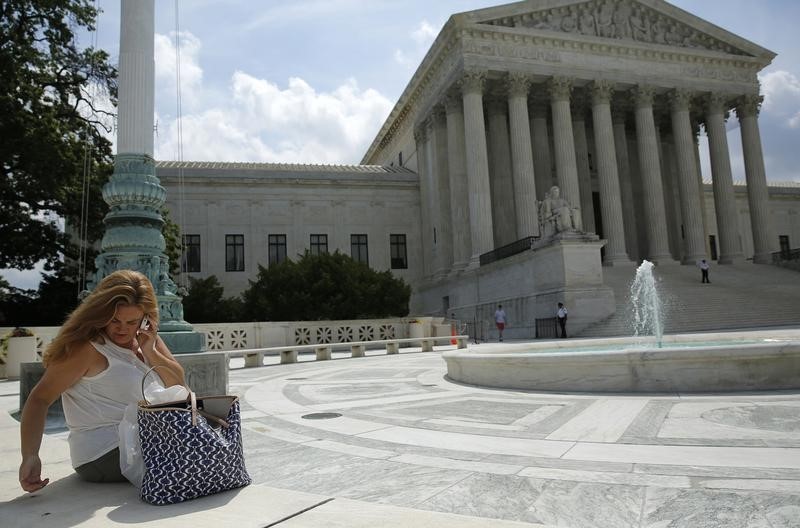By Lawrence Hurley
WASHINGTON (Reuters) - Conservative U.S. Supreme Court justices on Monday voiced support for a legal challenge that could erode organized labor's clout by depriving public-employee unions of millions of dollars in fees that many state laws force non-union members to pay.
Justices John Roberts, Anthony Kennedy and Antonin Scalia indicated during an 80-minute oral argument that they could join the nine-member court's two other conservatives to overturn a 1977 high court precedent allowing the fees, a vital source of funds for the unions.
Legal experts had thought Scalia might be sympathetic to the union position due to prior votes and statements on the subject, but his questions signaled support for the 10 non-union California public school teachers who challenged the fees.
U.S. conservatives have long sought to curb the influence of unions representing public employees like police, firefighters and teachers that often support the Democratic Party and liberal causes.
A ruling allowing non-union workers to stop paying "agency fees" equivalent to union dues, currently mandatory under laws in about half the 50 states including California, could strip public sector unions of millions of dollars, reducing their income and political power.
About 5 million public sector employees are subject to union contracts that include mandatory fee provisions, according to the National Right to Work Legal Defense Foundation, which backs the non-union teachers.
Unions worry that a ruling throwing out the fees would give workers less incentive to join because they would get all the benefits of collective bargaining without having to pay for it.
Chief Justice Roberts and Kennedy appeared unsympathetic to the California Teachers Association's argument that non-members would become "free-riders" if not required to pay the fees to fund collective bargaining activities.
"The union basically is making these teachers 'compelled riders' for issues on which they strongly disagree," Kennedy said.
Roberts said the majority of the California teachers union's members appeared to back collective bargaining, making the "free-riders" concern "really insignificant."
The teachers who filed the lawsuit in 2013 are asking the justices to overturn the 1977 Abood v. Detroit Board of Education Supreme Court ruling that allowed these unions to collect fees from workers who are not members as long as the money is not spent on political activities.
California teachers generally pay around $1,000 annually in union dues. Non-members can opt out of paying for union political activities, which means they pay around $600 a year in mandatory fees covering collective bargaining.
Several justices hinted at the difficulties of separating out political issues in a way that would not infringe upon the free-speech rights under the U.S. Constitution of non-members who disagree with the union.
"The problem is that everything that is collectively bargained with the government is within the political sphere, almost by definition," Scalia said.
'RIGHT-TO-WORK' STATES
Roberts and Scalia seemed skeptical that unions would collapse without fees from non-union employees, in part because such fees are already banned in 25 states that have what is known as "right-to-work" laws. In those states, unions still represent workers but membership rates are lower.
Federal employee unions also cannot collect such fees.
Even when the union's lawyer, David Frederick, sought to explain routine issues on which the union negotiates such as teacher lunch breaks, he faced hostile questions.
Kennedy said if the union believes it is doing a sound job negotiating over such daily concerns, "the union can convince people to join."
The court's liberals defended the current practice and said justices usually think twice before overturning long-standing precedents.
"You come here with a heavy burden," Justice Elena Kagan told the teachers' lawyer, Michael Carvin.
A ruling favoring the non-union teachers would be a blow to organized labor because unionized teachers and other civil servants in states without "right-to-work" laws comprise its main power base. Public sector workers are almost six times more likely to belong to a union than those in the private sector.
The dispute pits non-union teachers and the Christian Educators Association International against the California Teachers Association, an influential union with 325,000 members. The conservative Center for Individual Rights sued on behalf of lead plaintiff Rebecca Friedrichs, an elementary school teacher in Anaheim, and the other teachers.
The union noted that California law requires it to represent all workers when negotiating with the state, regardless of whether they are members.

A ruling is due by the end of June.